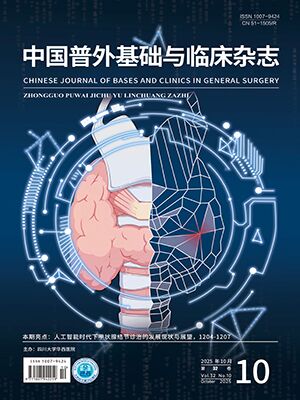| 1. |
Nygren J, Thacker J, Carli F, et al. Guidelines for perioperative care in elective rectal/pelvic surgery: Enhanced Recovery After Surgery (ERAS®) society recommendations. World J Surg, 2013, 37(2): 285-305.
|
| 2. |
Kehlet H. Multimodal approach to control postoperative pathophysiology and rehabilitation. Br J Anaesth, 1997, 78(5): 606-617.
|
| 3. |
杨淑迪, 钟雨莉, 刘玲, 等. 加速康复外科在新生儿围手术期管理中的应用与展望. 昆明医科大学学报, 2020, 41(5): 1-6.
|
| 4. |
顾岩, 杨建军, 宋志成, 等. 加速康复理念在减重及代谢外科的应用和规范化开展. 中国实用外科杂志, 2020, 40(4): 389-392.
|
| 5. |
包维民, 嵇武. 加速康复外科在云南省的现状与期望. 云南医药, 2019, 40(2): 160-163.
|
| 6. |
Hasenberg T, Keese M, Längle F, et al. ‘Fast-track’ colonic surgery in Austria and Germany—results from the survey on patterns in current perioperative practice. Colorectal Dis, 2009, 11(2): 162-167.
|
| 7. |
李卡, 胡艳杰, 刘雨薇, 等. 加速康复外科应用于结直肠癌根治术围手术期管理的效果研究. 中华结直肠疾病电子杂志, 2018, 7(3): 288-293.
|
| 8. |
朱斌, 黄建宏. 加速康复外科在我国发展现状、挑战与对策. 中国实用外科杂志, 2017, 37(1): 26-29.
|
| 9. |
季昌永, 刘连新. 加速康复外科的规范与安全. 中国普外基础与临床杂志, 2020, 27(1): 7-12.
|
| 10. |
陈俊强, 柳思雨. 加速康复外科临床实践争议问题与思考. 中国普外基础与临床杂志, 2019, 26(11): 1273-1277.
|
| 11. |
孔祥兴, 李军, 丁克峰. 结直肠癌加速康复外科开展的要点和难点. 中华胃肠外科杂志, 2016, 19(3): 260-261.
|
| 12. |
van Zanten F, Schraffordt Koops SE, Pasker-De Jong PCM, et al. Learning curve of robot-assisted laparoscopic sacrocolpo(recto)pexy: a cumulative sum analysis. Am J Obstet Gynecol, 2019, 221(5): 483. e1-483. e11.
|
| 13. |
Meier M, Horton K, John H. Da Vinci© Skills SimulatorTM: is an early selection of talented console surgeons possible? J Robot Surg, 2016, 10(4): 289-296.
|
| 14. |
Wu MP, Huang KH, Long CY, et al. Trends in various types of surgery for hysterectomy and distribution by patient age, surgeon age, and hospital accreditation: 10-year population-based study in Taiwan. J Minim Invasive Gynecol, 2010, 17(5): 612-619.
|
| 15. |
Liu Z, Yang M, Zhao ZX, et al. Current practice patterns of preoperative bowel preparation in colorectal surgery: a nation-wide survey by the Chinese Society of Colorectal Cancer. World J Surg Oncol, 2018, 16(1): 134.
|
| 16. |
Agache A, Mustăţea P, Mihalache O, et al. Diabetes mellitus as a risk-factor for colorectal cancer literature review—current situation and future perspectives. Chirurgia (Bucur), 2018, 113(5): 603-610.
|
| 17. |
González N, Prieto I, Del Puerto-Nevado L, et al. 2017 update on the relationship between diabetes and colorectal cancer: epidemiology, potential molecular mechanisms and therapeutic implications. Oncotarget, 2017, 8(11): 18456-18485.
|
| 18. |
Soltani G, Poursheikhani A, Yassi M, et al. Obesity, diabetes and the risk of colorectal adenoma and cancer. BMC Endocr Disord, 2019, 19(1): 113.
|
| 19. |
王治国. 浅谈加速康复外科模式下术前口服碳水化合物在结直肠外科中的应用及可能机制. 中华结直肠疾病电子杂志, 2017, 6(1): 15-20.
|
| 20. |
Onalan E, Andsoy II, Ersoy OF. The effect of preoperative oral carbohydrate administration on insulin resistance and comfort level in patients undergoing surgery. J Perianesth Nurs, 2019, 34(3): 539-550.
|
| 21. |
Kelley SR, Wolff BG, Lovely JK, et al. Fast-track pathway for minimally invasive colorectal surgery with and without alvimopan (Entereg)TM: which is more cost-effective? Am Surg, 2013, 79(6): 630-633.
|
| 22. |
Ghadban T, Reeh M, Bockhorn M, et al. Minimally invasive surgery for colorectal cancer remains underutilized in Germany despite its nationwide application over the last decade. Sci Rep, 2018, 8(1): 15146.
|
| 23. |
Lehman A, Kemp EV, Brown J, et al. Pre-emptive non-narcotic pain medication before minimally invasive surgery in gynecologic oncology. J Minim Invasive Gynecol, 2020 Jul 27:S1553-4650(20)30353-8[Online ahead of print].
|
| 24. |
Cheng CC, Hsu YR, Chern YJ, et al. Minimally invasive right colectomy with transrectal natural orifice extraction: could this be the next step forward? Tech Coloproctol, 2020, 24(11): 1197-1205.
|
| 25. |
Feigel A, Sylla P. Role of minimally invasive surgery in the reoperative abdomen or pelvis. Clin Colon Rectal Surg, 2016, 29(2): 168-180.
|
| 26. |
Liu H, Xu M, Liu R, et al. The art of robotic colonic resection: a review of progress in the past 5 years.Updates Surg, 2021, [Online ahead of print].
|
| 27. |
Ljungqvist O, Scott M, Fearon KC. Enhanced recovery after surgery: a review. JAMA Surg, 2017, 152(3): 292-298.
|
| 28. |
杜娜, 郭成林, 杨梅, 等. 加速康复外科在中国大陆胸外科临床现状—基于胸外科医生及护士调查分析. 中国肺癌杂志, 2017, 20(3): 157-162.
|




